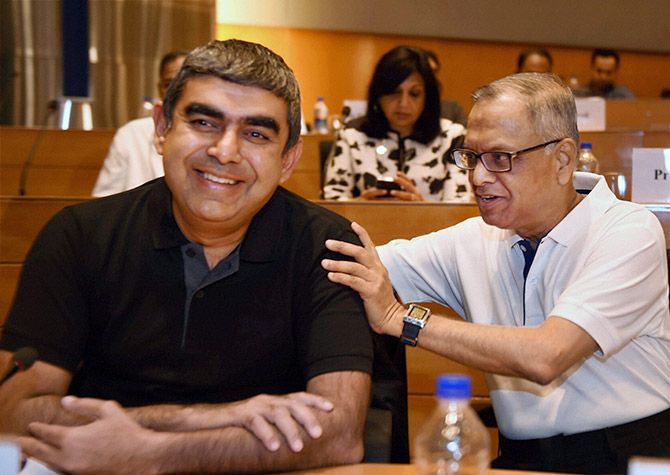More and more the buck will stop at the board. Look no further than Infosys, says Amit Tendon.

Photograph: Shailendra Bhojak/PTI.
Institutional ownership of the S&P BSE 500 companies has been steadily increasing. But there is another discernible shift within, regarding governance of companies, that is taking place: The number of companies that are both institutionally owned and board-managed is starting to increase rapidly. This will have far-reaching consequences for the market.
Data on institutional ownership (foreign institutional investors, domestic institutional investors and other institutions), widely tracked, show institutional ownership at 37.9 per cent in March 2017, up from 31 per cent in March 2001 and a low of 29.2 per cent in December 2008.
The second set of companies -- board-managed companies (BMCs) -- have also seen an increase. Expect companies in this set to see the rapidest growth for a number of reasons, discussed below.
First, expect more of the existing board-managed companies to list their existing subsidiaries.
ICICI Bank has listed its life insurance subsidiary, and is working to list its general insurance arm. Larsen & Toubro listed two of its subsidiaries. Though promoted by ICICI and L&T, these better fit the board-managed category.
For those not convinced, I will go back a few decades: HDFC, promoted by ICICI, snapped its umbilical cord as they treaded on each other. The pace of change is faster now.
Two, market infrastructure companies like stock exchanges and depository companies are beginning to get listed.
Three, spin-offs such as Crompton Greaves carving out their consumer business and selling it to private equity (PE). Expect PE to steadily add to this number as they back professional teams -- the number of buyout funds and transactions today is a clear pointer.
When the scale of operations was small, they exited to other larger PE firms. But as PEs have put more and more capital to work, it's markets that provide the most viable exit. And though they may 'control' the business today, expect them to exit completely tomorrow, leaving these businesses to be run by boards.
Finally, while regulators still frown on promoter-less listings, they are no longer black swan sightings. There is a steady stream of such offerings in the market. Collectively, these will matter, particularly as they become part of the frontline indices -- which they will.
What should one expect when professionally-managed companies gain ground?
As more and more businesses are board-managed, boards will move centre stage, with the roles becoming more complex. The buck will stop at the board: Look no further than Infosys' board.
There are no 'promoters' to turn to for taking strategic decisions or to recapitalise if needed. The skill levels expected by the board are of a higher order as they achieve a balance between the appropriate amount of oversight and guidance. They will need to be familiar with the company's business, but will also have to bring some additional skills to the boardroom.
While all this no doubt is true today, for the majority of companies, there is a promoter -- whether a business family, a foreign parent or the government of India -- so boards are not being stretched.
In the future, though, the skills needed are set for a dramatic overhaul.
At present the fuss is all about related party transactions.
Are these abusive?
Are these being using to tunnel money?
Regulations are focused on protecting minority investors. Markets and regulations will need to evolve from defining board composition, with reference to promoter and non-promoters, to skill sets on the board and from liabilities of the promoters to dealing with boards that glad-hand CEOs.
This focus will also shift to compensation. We already see many 'promoters' disregarding performance-linked pay when voting for their own pay rise. Their membership of the remuneration committee makes this easy.
In professionally managed firms, we are already seeing senior management cornering a large portion of employee stock ownership plans (Esop) for themselves, and then doubling up on these by grabbing them from subsidiaries.
As boards come to rely more on CEOs to deliver, and CEOs drive decisions on board rewards, the risk of an unhealthy bond between them will only increase.
Compensation is difficult to regulate. So, institutional investors will need to evolve their approach. We are seeing some global investors routinely shoot down compensation if it is higher than the median pay rise. This will need to be more widespread if it needs to be effective.
Admitted, this change will not happen overnight, but the market does not have the luxury of taking a generational view either. It is, therefore, important that both regulators and investors develop a framework to deal with the coming shift.
And the best time to begin is now.
Amit Tendon is with Institutional Investor Advisory Services.










